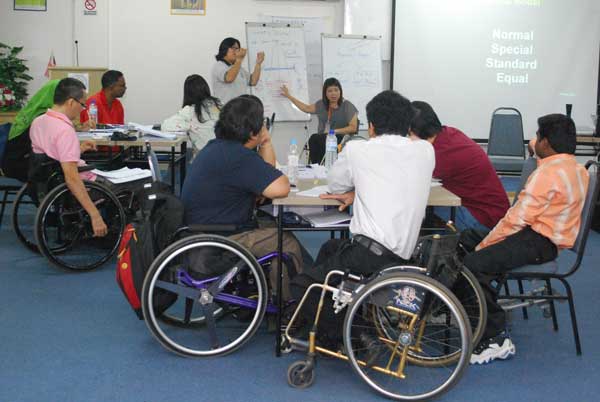Disabled people in need of a better peer support system
by Peter Tan. Posted on January 25, 2015, Sunday
As disabled people, we have a lot to contend with in the course of trying to make something out of our lives. We have to deal with our own impairments and at the same time struggle to make sense of a world that has largely disregarded us as equals.
On a personal level, it is not unusual for us to experience low self-esteem, lack of self-worth and a sense of hopelessness. We feel that our impairments make us lesser persons. Because of that, we accept our exclusion from society as the norm. We blame ourselves for all the problems we face.
“I cannot go out because I am using a wheelchair” is our common grouse when asked why we stay at home most of the time.
On a societal level, misconceptions and prejudices are aplenty. We are also seen as lesser persons, our impairments the result of karma, divine retribution on our parents or of our own doing. The sight of us somehow evokes pity and charity.
Our sense of hopelessness is further reinforced when we are constantly told that the problems we face are caused by our impairments. In order to be accepted as a part of society, we are expected to strive to be “normal” and “abled-bodied” to conform to mainstream standards.
These notions perpetuate fallacious views that are accepted by both disabled- and non-disabled people as the gospel truth. Non-disabled people want to fix our impairments so we can be “whole”. Disabled people want to be fixed so we can fit into mainstream society.
If we cannot achieve the normality desired by society, we are told that we are lazy and did not try hard enough. A fellow participant from a positive thinking workshop that I attended once told me straight to the face that I could not walk because I did not have a strong determination. If only it was that easy.
It is a vicious cycle but one that can be broken if it can be explained logically that people are disabled more by attitudinal, environmental and institutional barriers rather than by their impairments. In this aspect, there is a need for a better peer support system to edify disabled people.
Peer means person of equal standing with other members in a community or organisation who has relevant life experience and can support other members in similar situations. Disabled people who have undergone training to provide peer support are known as peer counsellors.
Peer support can be done as a group activity or one-to-one. In countries where the independent living movement of disabled people are active, peer counsellors take leadership roles in peer support groups as facilitators in independent living skills training, information sharing, and providing emotional and moral support. These are achieved through discussion, sharing of experiences and role-playing.
In one-to-one peer counselling, the sessions are highly personalised. During these sessions, counsellors help their peers recover from past hurt, discover potentials and gain confidence to make decisions to change for the better. They are role models to show that disabled people have the capabilities to lead a better quality of life.
Nevertheless, this building of self-confidence and establishing self-worth is an arduous process. The negative perceptions that were drummed into our minds are deep-rooted and difficult to shake off. It takes time and many sessions of counselling. Some disabled people take years to achieve this goal.
In providing peer support, there are guidelines that should be adhered to. They include being non-judgemental and not imposing specific values on others. Peer counsellors also must acquire skills to create a conducive atmosphere for discussions, maintain confidentiality, respect differing opinions, listen attentively and ask appropriate questions.
Most importantly, the understanding of disability rights and possessing a Social Model of Disability perspective is compulsory. Otherwise, how can peer counsellors help other disabled people break away from the cycle of self-blame and resist the urge to conform to the unfair demands of society?
(The Social Model of Disability says that people are inconvenienced by how society is structured. It promotes the removal of barriers to enable disabled people live independently and as equals in society.)
In Malaysia, peer support is carried out on an ad hoc basis at personal expenses and time. This is not an issue as it is a voluntary service willingly provided by individuals in the spirit of camaraderie. However, it must be noted that most peers providing support are not trained. It is learnt through trial and error.
An organised peer support system is crucial to the empowerment of disabled people. Empowered disabled people in turn can debunk society’s prejudices and misconceptions with logical arguments, and that what needs fixing are attitudes, environment and discriminatory policies.
It would be better that peers go through basic training at the very least on the techniques of proper peer support in order for them to lead the people they are helping in the right direction and give them the right orientation on disability issues.
There are local resource persons who can conduct peer counselling workshops. If need be, there are experienced and practicing peer counsellors from around the Asia Pacific who will be more than happy to come and train us. This is a matter worth considering since it involves the improvement in the social and emotional wellbeing of disabled people.
Comments can reach the writer via columnists@theborneopost.com.

